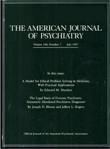Control groups for psychosocial intervention outcome studies
Abstract
In psychosocial outcome research, as contrasted to pharmacologic research, control groups receiving inert treatment, designed to raise expectations but otherwise provide no service, are almost never indicated; this is true because of methodologic as well as ethical reasons. Four types of comparisons suffice as alternatives: treatment versus no treatment, treatment versus minimal treatment, treatment A versus treatment B, and dismantling. When choices are made among these types of comparisons with power analysis and eight other factors taken into account, the questions of outcome research should be answerable with maximum economic efficiency, with maximum benefit to subjects, and without deception.
Access content
To read the fulltext, please use one of the options below to sign in or purchase access.- Personal login
- Institutional Login
- Sign in via OpenAthens
- Register for access
-
Please login/register if you wish to pair your device and check access availability.
Not a subscriber?
PsychiatryOnline subscription options offer access to the DSM-5 library, books, journals, CME, and patient resources. This all-in-one virtual library provides psychiatrists and mental health professionals with key resources for diagnosis, treatment, research, and professional development.
Need more help? PsychiatryOnline Customer Service may be reached by emailing [email protected] or by calling 800-368-5777 (in the U.S.) or 703-907-7322 (outside the U.S.).



